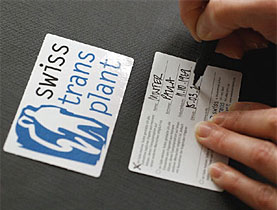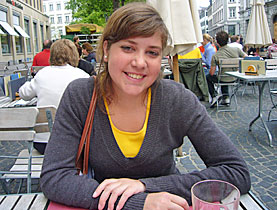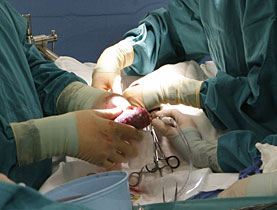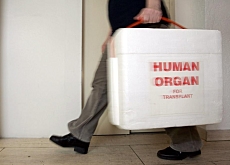Swiss reach out to foreign organ donors

The Federal Health Office is stepping up its organ donation awareness campaign by taking the message to foreign residents.
One in five people living in Switzerland is foreign. The largest communities, excluding those speaking national languages, speak Albanian, Bosnian/Croatian/Serbian and Portuguese.
Brochures in these languages, along with Spanish and English, are being made available explaining the issue of organ donation and enclosing a blank donor card.
The phenomenon of demand exceeding supply is common to all countries with an organ donation programme but Switzerland has a worse record than other comparable nations.
Fifty people on the waiting list died last year, despite a new transplant law establishing a centralised system that came into force in July 2007. With only 10.8 donors per million, Switzerland falls way behind Spain (33.8) and France (23.2).
“I can confirm that Switzerland has fewer organ donations per million population than many European countries – that’s a fact, although the figures are rather difficult to compare directly,” Theodor Weber, head of the transplantation unit at the Federal Health Office told swissinfo.
Ready and willing
“But it’s not true that the Swiss population is less willing to donate. We have the same willingness to donate as neighbouring countries. Switzerland is a leading country in living organ donation [kidney or part of liver] and has a low refusal rate among detected donors.”
Weber explained some of the reasons why willingness to donate did not necessarily translate into operations carried out. One of the minor though not negligible factors is safer roads.
“Switzerland has fewer traffic injuries, which can result in organ donation. It also has a greater number of institutions offering central nervous system surgery and more patients undergo brain surgery.”
As a general rule it is only possible to remove organs or tissue if a person dies in intensive care.
But the most important factor keeping the figures low appears to be administrative. “The detection of potential donors in hospital has to be improved and adequate treatment for this person put in place,” he said.
“Switzerland has a highly decentralised health system with high-level treatment available in a large number of small centres.” This, he said, makes donor management more difficult. “It’s easier to organise organ donations in larger centralised hospitals.”
Card carriers
Swiss Transplant, the Swiss national foundation for organ donation and transplantation, has played a key role in the campaign to distribute more donor cards. An estimated 15 per cent of the population now carry a card.
“I’m sending out up to 5,000 cards every day,” a Swiss Transplant spokeswoman told swissinfo. “The interest is here, especially among young people.”
“People want to be informed,” she added. “As we are a multicultural country, I think it is important that we have information available in several languages.”
Weber was careful to point out that his department was not in the business of promoting donation but had a neutral role to play.
“The goal of the campaign is to raise awareness and ask people to make their own decision. We don’t want to tell people to become donors. We just want to provide good information and ask them to choose,” he said.
But he acknowledges that the natural result of greater awareness will be more donor cards in wallets.
Distribution plans are still at an early stage and the leaflets are currently only available online. The Federal Health Office has put feelers out to cantonal authorities and hospitals to test the level of interest. They are open to distributing through non-medical channels such as cultural centres for immigrants.
“If a group approaches us looking for material, we will provide it,” Weber said.
Country of origin of foreigners permanently resident in Switzerland at the end of 2007*
Italy 289,589
Germany 201,889
Serbia (included Kosovo) 187,365
Portugal 182,324
France 77,433
Turkey 72,633
Spain 68,236
Macedonia 59,967
Bosnia and Herzegovina 39,281
Croatia 37,844
Central and South America 40,000+
*includes Swiss-born foreigners
The transplant law of July 1, 2007 established a centralised system for organ transplants.
Under the new law, the waiting list is also handled centrally. Allocation is done by computer, taking into account the urgency of the case, the benefit to the patient, and the length of time on the waiting list.
It is forbidden to buy or sell organs.
Organs can only been removed if the donor has agreed, for example by carrying a donor card. Otherwise next-of-kin must give permission.
The Federal Health Office estimates that 15% of the population carry a card. Anyone over the age of 16 can do so.
At the end of 2007 there were 870 names on the waiting list for organs.
In 2007, 437 organs were transplanted in Switzerland.

In compliance with the JTI standards
More: SWI swissinfo.ch certified by the Journalism Trust Initiative




You can find an overview of ongoing debates with our journalists here . Please join us!
If you want to start a conversation about a topic raised in this article or want to report factual errors, email us at english@swissinfo.ch.